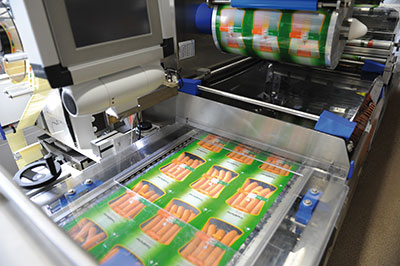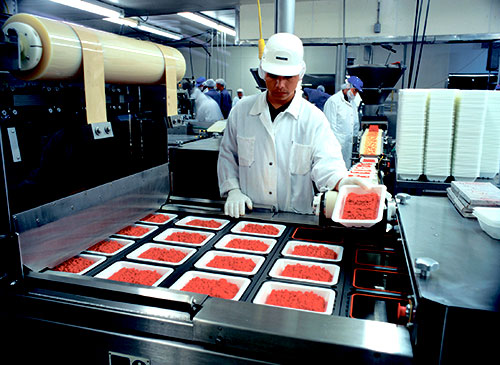By Melissa Kelly-Jones
Unlike compressed air applications, where there are rigorous standards that dictate the quality and specification of air used during the process, there are no current standards in place for exhaust air quality from vacuum pumps. Melissa Kelly-Jones, UK F&B Vacuum Solutions Expert at Gardner Denver, outlines key considerations that should be taken when looking at vacuum technology.
 Keeping compressed air clean
Keeping compressed air clean
ISO8573 is the group of international standards stipulating the quality of compressed air. Consisting of nine separate parts, part one highlights the amount of contamination allowed in each cubic metre of compressed air and the remaining eight specify the methods of testing for a range of contaminants. This ranges from oil aerosol content and humidity, to solid particle and oil vapour content.
Naturally, air quality is particularly important in a food and beverage manufacturing environment. Most sites will follow the recognised principles of the Hazard Analysis Critical Control Point (HACCP) to ensure they are complying with hygiene legislation, removing any potential hazards or reducing these to an acceptable level. Yet, while product manufacturing process are scrutinised in great detail, ancillary processes and utilities can often be omitted. Crucially, this can mean potential risks from equipment such as vacuum pumps are overlooked.
 Identifying potential risks
Identifying potential risks
With vacuum systems generally located around the production environment, contaminants from or passed on via a pumps exhaust can be hazardous and, as a result, this equipment should be included within a facility’s HACCP assessment. The majority of vacuum pumps currently in use are oil-lubricated and many applications will operate without any problems arising. Nevertheless, there is the potential risk of oil discharging from the exhaust, which presents a particularly significant problem in a food and beverage manufacturing plant.
In addition to oil discharge from the exhaust, there are a number of other issues that operators need to be aware of. Operating at high temperatures and an open-ended inlet port could result in oil carrying over from the pump, while a separator element may fail due to misuse or through the use of non-genuine spare parts. For this reason, it is important to work with a trusted and experienced maintenance partner, who can help and offer support should these matters arise.
The potential risks from leaks from an oil-lubricated vacuum pump can be avoided through a range of measures. These include using a food grade lubricant, fitting a downstream exhaust filter or remotely piping the exhaust air.
Gardner Denver offers a free six year warranty called Assure on all new and existing rotary vane vacuum pumps for complete peace of mind, as well as an extensive network of qualified engineers that can deal with any on-site repair and maintenance should an issue arise. A professional service centre is also available, should a pump require a more comprehensive overhaul.
For those concerned about the risks of oil-lubricated vacuum pumps, Gardner Denver can help identify and reduce any risks through a free site survey, which may extend to working with the production team to ensure the equipment is included in the HACCP assessment.
A clean solution
The most efficient and assured solution would be to use an oil-free vacuum pump. These have been specifically developed to meet the needs of manufacturers that require only the highest air purity environments. Oil-free technology does not require the same level of maintenance as oil-lubricated, as there is no requirement to replace oil or filters which significantly reduces whole life costs.
 Additionally, the fact the pump does not have to be removed to carry out routine maintenance servicing means there is no additional unnecessary production downtime, as well as any indirect costs from lost pump uptime. There is also the benefit of the, now avoidable, cost of oil, waste oil disposal and labour. With potentially increased outputs and greater uptime, the benefits of an oil-free technology are clear.
Additionally, the fact the pump does not have to be removed to carry out routine maintenance servicing means there is no additional unnecessary production downtime, as well as any indirect costs from lost pump uptime. There is also the benefit of the, now avoidable, cost of oil, waste oil disposal and labour. With potentially increased outputs and greater uptime, the benefits of an oil-free technology are clear.
Gardner Denver offers a range of oil-free vacuum pumps, each suited to the particular requirements of individual applications. For instance, the S-VSI dry-running vacuum pump for packaging under protective gas needs no coolant or sealing medium in the suction chamber. This particular pump is water-cooled and offers low heat emission into the environment.
There is potential for food producers to reap the rewards of oil-free vacuum technology. Investing in oil-free technology will ensure the improved standards of air quality, as the food and beverage sector continually seek improvements in process efficiency and quality across all of their processes.
For further press information on Oil Free Technology or to discuss improvements to your vacuum solution, please contact Melissa at:
Melissa.kelly-jones@gardnerdenver.com.

